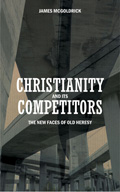
James McGoldrick
Reviewed by: Cliff Blair
Christianity and Its Competitors: The New Faces of Old Heresy, by James McGoldrick. Published by Christian Focus, 2006. Paperback, 206 pages, list price $10.99. Reviewed by OP pastor Cliff Blair.
The author takes up four heretical movements that plagued the ancient church: the Ebionites, Montanism, Arianism, and Pelagianism. Each is sketched in its context, highlighting one or more defining characteristics. He then traces the errors across the ages up to our day, drawing connections between the heresies and modern groups.
He finds shades of Ebionite works-righteousness in the Eastern Orthodox and Roman Catholic churches, as well as amongst their harshest critics, the fundamentalists. Montanism's advocacy of continuing revelation is seen not only in Pentecostal and charismatic churches, but also in the Roman church, pseudo-Christian cults (Mormons, Christian Scientists), and the lunatic fringes of religion. He shows Arianism's shaping influence on Unitarian universalism, Mormonism (Trinitarian language notwithstanding), and Jehovah's Witnesses.
In the longest chapter, McGoldrick shows that while the ancient error of Pelagianism was decisively rejected by the ancient church in 431, the muted form, semi-Pelagianism, continued to flourish long after its official condemnation in 529. With ample citations from original sources, he establishes that this remains the position of Rome. He then traces the doctrine within Protestantism from Jacob Arminius to its now dominant position within evangelicalism.
Although numerous errors are addressed, one predominates: rejection of biblical authority. The doctrine of the sufficiency of Scripture is presented in a fifth chapter and an appended sermon by Geoffrey Thomas. The author ardently desires that Christians be governed by the objective Word of God. Indeed, this ardency raises a reservation: so firmly does McGoldrick advocate for objectivity over subjectivity, for thinking over emotionalism, that one might conclude that he finds no place for subjective or emotional engagement in the life of faith.
This concise, readable book makes plain the blessings of studying church history and the perils of neglecting it. It could be used profitably for group study. However, the person leading such a group should be prepared to make the exegetical case for the orthodox positions endangered and to answer the biblical arguments for the errors—e.g., the charismatic's appeal to 1 Corinthians 12-14, the Jehovah's Witness's to Colossians 1:15,or the Arminian's to 1 Timothy 2:4. This book shows the pedigree of these misinterpretations, but does not engage them in close exegetical combat. For the latter effort, the author's notes and suggested readings are a rich resource.
March 30, 2025
On the Trail with a Missionary
March 23, 2025
Midnight Mercies: Walking with God Through Depression in Motherhood
March 16, 2025
March 09, 2025
Zwingli the Pastor: A Life in Conflict
March 02, 2025
February 23, 2025
African Heroes: Discovering Our Christian Heritage
February 16, 2025
© 2025 The Orthodox Presbyterian Church